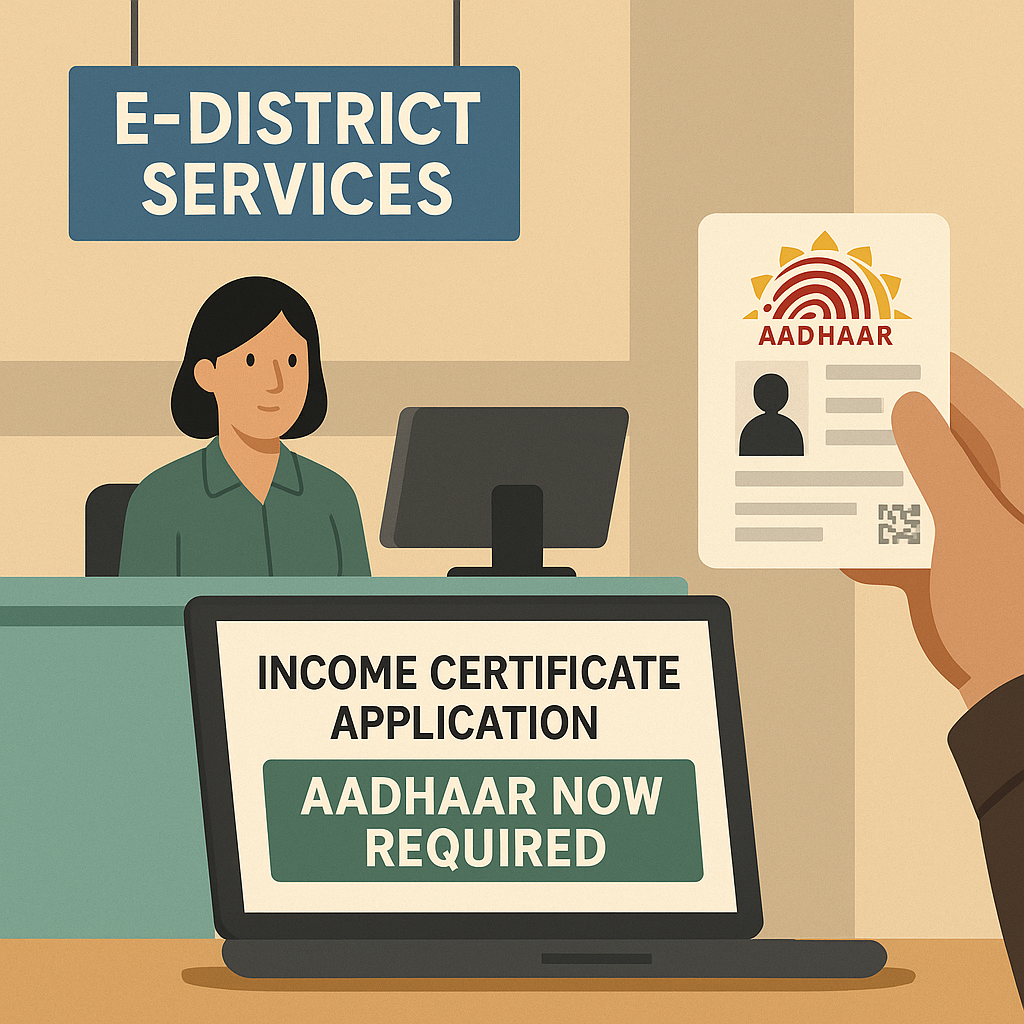The Delhi government has made it mandatory to link Aadhaar with income certificate applications, marking a major shift in how welfare benefits and subsidies will be accessed in the city. This move, announced through a recent directive by the Revenue Department, aims to enhance identity verification, reduce duplication, and streamline service delivery. But what does this mean for the average resident of Delhi, and how will it impact those who rely on income certificates for accessing government schemes?
Let’s break down the new rules, their implications, the exceptions, and how Delhiites can navigate this transition effectively.
What’s Changed: Aadhaar Now Compulsory for Issuing Income Certificates
From now on, all residents applying for an income certificate in Delhi must furnish their Aadhaar number at the time of application. This requirement applies both to first-time applicants and those seeking renewal.
This change is in line with Section 7 of the Aadhaar Act, 2016, which allows Aadhaar authentication to be made mandatory for accessing certain government services and subsidies. For Delhi, income certificates are vital documents that help residents avail fee concessions, apply for EWS quotas, or prove eligibility for various state-level welfare programs.
Why Aadhaar? The Reason Behind the Move
The government states that the move is intended to:
- Eliminate duplicate and fraudulent entries
- Ensure faster processing and verification
- Target subsidies to genuine beneficiaries
- Link digital identity with public services
By making Aadhaar mandatory, the authorities aim to prevent misuse of government schemes and streamline the citizen-service delivery ecosystem.
What If You Don’t Have Aadhaar Yet?
If an applicant doesn’t possess Aadhaar, the government has allowed temporary alternatives under strict conditions. In such cases, applicants can furnish any of the following documents:
- Aadhaar enrolment ID slip
- Passport
- Voter ID
- PAN Card
- Ration Card
- MGNREGA job card
- Driving licence
However, the applicant must enrol for Aadhaar within 90 days, and provide proof of enrolment. Failure to do so may lead to rejection of the application or cancellation of the benefits obtained through the certificate.
Application Process for Income Certificate: What Has Changed?
The actual application method—through the **e-District Delhi portal (https://edistrict.delhigovt.nic.in)**—remains the same. But Aadhaar will now be verified via OTP authentication or biometric validation during application.
Applicants must ensure their Aadhaar is:
- Linked with their mobile number for OTP
- Updated with correct demographic details (especially name, DOB, and address)
Once verified, the certificate is digitally signed and made available for download.
Real-World Scenario
Let’s take a typical example:
“An EWS-category student needed to apply for a school fee concession through the income certificate. Earlier, their father submitted voter ID and ration card for verification. Now, with Aadhaar made mandatory, they had to first update Aadhaar details and ensure mobile OTP linking—this added an extra 4–5 days to the process.”
This underlines how critical it is to ensure Aadhaar details are up-to-date before applying.
What About Data Privacy and Consent?
The circular reiterates that Aadhaar data will be used only for authentication and not for profiling. Aadhaar consent forms are part of the application process, ensuring applicants understand and agree to how their data is used.
The Aadhaar ecosystem now includes better encryption protocols and compliance with UIDAI’s data protection norms, reducing risks of misuse.
Impact on Vulnerable Groups
This change will especially affect:
- Daily wage workers and informal sector employees, who often lack Aadhaar or face biometric mismatch issues
- Elderly applicants, whose fingerprints or iris scans may not authenticate easily
- Migrants, who may not have Delhi address on Aadhaar
Government offices are being instructed to offer support desks for Aadhaar enrolment, correction, and grievance handling—but their effectiveness remains to be seen.
Possible Delays and Suggestions
Applicants can expect:
- Slight delays in initial weeks due to transition
- Increased footfall at Aadhaar update centers
- Technical issues in rural zones or slum clusters with poor biometric match rates
To reduce disruptions, the government should:
- Set up mobile Aadhaar vans near revenue offices
- Offer helplines for Aadhaar-related queries
- Enable offline Aadhaar validation for senior citizens
Aadhaar Integration and the Bigger Picture
This decision is part of a wider trend: Delhi has already made Aadhaar compulsory for certificates like caste, domicile, and marriage registration. The move aligns with Digital India and DBT (Direct Benefit Transfer) efforts, aimed at linking all welfare schemes with verified digital identity.
While the intent is progressive, execution challenges could still leave behind many who are unbanked, undocumented, or digitally unskilled.
Would You Be Affected?
If you’re planning to apply for an income certificate in Delhi, ensure:
- You have a valid Aadhaar linked to your mobile
- Your details on Aadhaar match your other documents
- You initiate Aadhaar enrolment if not already done
FAQs
Is Aadhaar mandatory to get an income certificate in Delhi now?
Yes, as per the latest directive from the Delhi government, Aadhaar is now mandatory for applying for an income certificate through the e-District portal.
Can I apply for an income certificate without Aadhaar in Delhi?
No. Applications without Aadhaar or Aadhaar enrollment number will not be accepted on the e-District portal after this update.
What is the purpose of making Aadhaar mandatory for income certificates?
The government aims to eliminate fake income certificates and ensure that benefits reach genuine and verified individuals by using Aadhaar as a unique identifier.
How can I apply for an income certificate online in Delhi?
You can visit the Delhi e-District portal to apply. Aadhaar number and other personal details must be provided for verification.
What other documents are needed along with Aadhaar?
Along with Aadhaar, you need a passport-size photo, residence proof (like voter ID, ration card, electricity bill), and any other supporting income proof.
Does this rule apply to students applying for scholarships?
Yes. Many scholarships and welfare schemes require income certificates, and Aadhaar authentication will now be a prerequisite to access these services.

